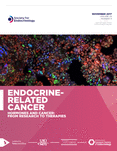Insulin resistance and cancer: the role of insulin and IGFs
- Sefirin Djiogue1,
- Armel Hervé Nwabo Kamdje2,3,
- Lorella Vecchio4,
- Maulilio John Kipanyula5,
- Mohammed Farahna6,
- Yousef Aldebasi7 and
- Paul Faustin Seke Etet6
- 1Department of Animal Biology and Physiology, University of Yaoundé 1, PO Box 812, Yaoundé, Cameroon
2Biomedical Research Center, University of British Columbia, 2222 Health Science Mall, Vancouver, British Columbia, Canada V6T 1Z3
3Department of Biomedical Sciences, University of Ngaoundéré, PO Box 454, Ngaoundéré, Cameroon
4Laboratory of Cytometry, University of Pavia, via Ferrata 1, 27100 Pavia, Italy
5Department of Veterinary Anatomy, Sokoine University of Agriculture, PO Box 3016, Chuo Kikuu, Morogoro, Tanzania Departments of
6Basic Health Sciences
7Optometry, College of Applied Medical Sciences, Qassim University, Buraydah, 51452 Al-Qaseem, Saudi Arabia
- (Correspondence should be addressed to P F Seke Etet; Email: paul.seke{at}gmail.com)
Abstract
Insulin, IGF1, and IGF2 are the most studied insulin-like peptides (ILPs). These are evolutionary conserved factors well known as key regulators of energy metabolism and growth, with crucial roles in insulin resistance-related metabolic disorders such as obesity, diseases like type 2 diabetes mellitus, as well as associated immune deregulations. A growing body of evidence suggests that insulin and IGF1 receptors mediate their effects on regulating cell proliferation, differentiation, apoptosis, glucose transport, and energy metabolism by signaling downstream through insulin receptor substrate molecules and thus play a pivotal role in cell fate determination. Despite the emerging evidence from epidemiological studies on the possible relationship between insulin resistance and cancer, our understanding on the cellular and molecular mechanisms that might account for this relationship remains incompletely understood. The involvement of IGFs in carcinogenesis is attributed to their role in linking high energy intake, increased cell proliferation, and suppression of apoptosis to cancer risks, which has been proposed as the key mechanism bridging insulin resistance and cancer. The present review summarizes and discusses evidence highlighting recent advances in our understanding on the role of ILPs as the link between insulin resistance and cancer and between immune deregulation and cancer in obesity, as well as those areas where there remains a paucity of data. It is anticipated that issues discussed in this paper will also recover new therapeutic targets that can assist in diagnostic screening and novel approaches to controlling tumor development.
- Revision received 18 November 2012
- Accepted 30 November 2012
- Made available online as an Accepted Preprint 3 December 2012
- © 2013 Society for Endocrinology












